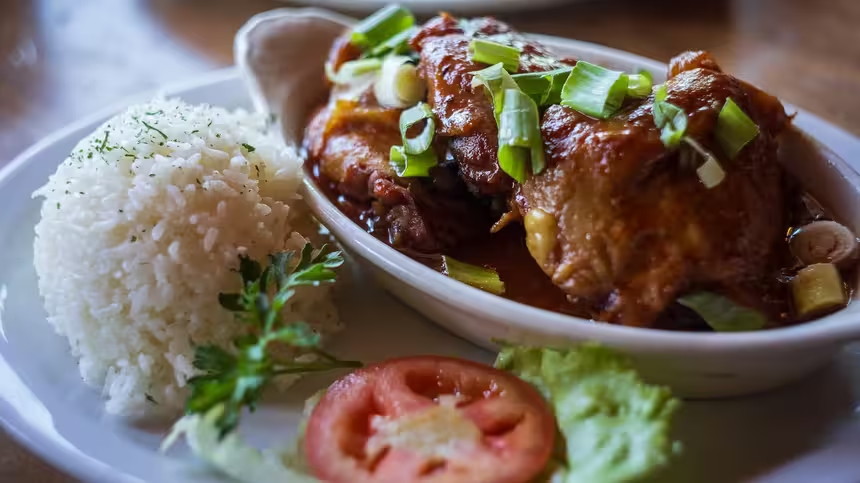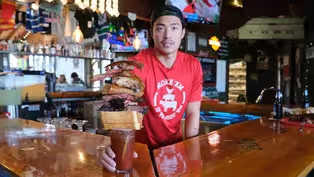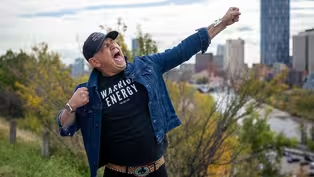
Canada’s Black Pioneers
Clip: Episode 3 | 6m 30sVideo has Closed Captions
Pati Jinich visits the town of Wildwood, founded by Canada’s early black settlers.
Pati Jinich visits the town of Wildwood in Alberta, which was founded by some of Canada’s earliest black settlers, to hear their story of resilience, community, and the search for a better life. Her visit culminates in a delicious BBQ, highlighting the food traditions that have become part of Alberta's cultural landscape.
Problems playing video? | Closed Captioning Feedback
Problems playing video? | Closed Captioning Feedback
Support for PATI JINICH EXPLORES PANAMERICANA is provided by Marriott International, La Costeña, Texas A&M International University, Visit Anchorage, Travel Juneau, Travel Yukon, and Chicanos Por La Causa.

Canada’s Black Pioneers
Clip: Episode 3 | 6m 30sVideo has Closed Captions
Pati Jinich visits the town of Wildwood in Alberta, which was founded by some of Canada’s earliest black settlers, to hear their story of resilience, community, and the search for a better life. Her visit culminates in a delicious BBQ, highlighting the food traditions that have become part of Alberta's cultural landscape.
Problems playing video? | Closed Captioning Feedback
How to Watch Pati Jinich Explores Panamericana
Pati Jinich Explores Panamericana is available to stream on pbs.org and the free PBS App, available on iPhone, Apple TV, Android TV, Android smartphones, Amazon Fire TV, Amazon Fire Tablet, Roku, Samsung Smart TV, and Vizio.
Buy Now

The Pati Jinich Recipe Collection
Find Pati Jinich recipes from this series and more on PBS Food.Providing Support for PBS.org
Learn Moreabout PBS online sponsorship70 miles west of Edmonton sits a small town that may not look like much... [Train whistle blows] until you know its history.
♪ It boasts a church, a general store, and a small hotel.
John Lindsay knows its origin because he lived it.
Pati: John, tell me a little bit about the story of Wildwood.
Wildwood?
Yeah.
Oh, I've been here all my life.
Pati: Yeah?
John: I was born here.
Born here about--oh, it's two miles from here.
Pati, voice-over: John's father was one of the first settlers in Alberta.
Pati: Was it segregated like the U.S., where it was divided?
John: No.
Pati: No.
No.
No, no, I know nothing about that BS.
No?
Yeah?
John: No.
Oh, yeah.
Swedes, Ukrainians, Germans--ev--we're mixed.
Pati, voice-over: Cheryl Melton-Lindsay is John's niece.
Yeah.
So this is my Uncle John here with my Uncle Floyd.
The reason I'm wanting to do the research is its needs to be transferred over to the next generation and keep it rolling.
And it's interesting because in the educational aspects down in the States, you learn so much about the States and everyone else around the world and not too much about Canada.
♪ Pati, voice-over: In the late 1800s, the Canadian government wanted to populate the prairies.
They introduced the Dominion Lands Act of 1872, offering 160 acres of land for just $10.
The deal required men aged 21 or older to farm at least 40 acres and build a home.
By 1909, with segregation laws and the Ku Klux Klan terrorizing Black communities in the southern U.S., a group of Black farmers headed north to Alberta, searching for freedom and opportunity.
Deborah Dobbins is one of Cheryl's friends.
Her grandfather was one of the original settlers.
Pati: What do you think they should be defined as?
Or what do they define themself as?
Deborah: We're the first group of Black people in Western Canada, so that clearly defines us.
Pati, voice-over: Deborah's husband Herbert.
They came as free citizens when they crossed the border, but they weren't really recognized.
So we are a unique group of people.
We didn't come Underground Railroad.
We didn't esc-escape.
S-slaves or--or slaves and then our masters made us free when we were in Canada.
We were invited... Pati: Yeah.
like everyone else, invited.
You know, there's poster.
Didn't say "Whites only."
So we came, and they shut us down.
♪ Cheryl: It was a nice, warm welcoming for the first few hundred.
Then after they're finding out more Blacks were coming into Canada, it wasn't.
Pati, voice-over: The newcomers from the South also had a tough time farming.
The weather was cold, the growing season shorter, and the dark black soil was different than the rusted red soil down south.
Coming to Canada?
Yes, tough coming in and--and--but once they got into their farmland, all the farmers helped each other and supported each other.
John: Sure.
[Indistinct chatter] Dear Lord, thank you for this day.
Thank you for the food that we're about to eat, and thank you for all of our new visitors here.
Pati: Ohh.
Deborah: Pork ribs.
Pati: Mm!
With barbecue.
Herbert: Here's the collard green.
Deborah: Collard and-- collards and mustard.
We grew the mustard... Pati: You did?!
Deborah: ourselves this year.
Herbert: And you get a little potato salad.
Pati: Ohh, I love potato salad.
Herbert: And then you get some of the, uh, cornbread muffins.
Troy made the cornbread.
Pati: So wonderful.
Deborah: That's what we want to have for these-- Deborah: for the little ones.
Pati: Yes!
So here's the next generation.
And this next generation also has the next generation.
Deborah: Yes.
And what do you feel about the--the work that your mom is doing?
Oh, I love it.
It needs to be done.
Pati: Yeah.
Yeah.
McKerry: It's--it's our history.
It needs to be preserved and documented and spread out to everybody, right?
Mm-hmm.
Pati, voice-over: Deborah, a former school teacher, founded the Shiloh Centre for Multicultural Roots in part because she believes this history is vastly underrepresented in Canadian school textbooks.
McKerry: I think it just comes from lack of knowledge.
Yeah.
McKerry: A lot of people, they might know their family story... Yeah.
but they don't know the bigger picture.
Pati, voice-over: Canada is finally taking notice.
The Royal Canadian Mint recently released a coin that commemorates early Black settlements.
McKerry: So when I was in elementary school, there was just me as the Black representation for the school.
I was the only Black kid in my school.
But the nice thing to see is with my children, they're going to school now, and their class is like the UN.
It's, there's kids from all over the world, all different backgrounds in their classes, in their school, which is nice because they get that nice mix.
They don't feel like, "Hey, why am I the only one different in class?"
Right?
It's not the one chocolate chip in the bowl of vanilla ice cream.
Pati: Yeah.
McKerry: Like, everybody else sees us as Black people.
But like you were just saying.
Pati: Yeah... McKerry: Haitians.
Uh, Caribbean, Jamaican, Trinidad.
There's South American, right?
There's Africans-Africans from, you know, Nigeria, Congo, everywhere.
So they're all different cultures.
People always ask, "Where are you from?"
"Well, where are your parents from?"
"Here."
Like, they-they don't have that concept of Black Canadians, Black Americans.
It's you have to be from an island or from Africa Pati: Yeah... McKerry: or... Well, we came in the 1900s, so... Pati: Right.
I'm from here.
What's the hope for people that are coming?
The hope for people that-- um, for them to learn our story, so they know that they're not the first ones to go through it.
They're not the first ones to blaze these new trails that are new to them.
But we've been here for over a hundred years, and we've done it.
Learn our history, we'll learn yours, and let's work together to make it a better place for everybody.
Canada’s Wildest Caesar Cocktail
Video has Closed Captions
Clip: Ep3 | 2m 58s | Pati Jinich visits Big Sky BBQ in Alberta to try their legendary Barbecue King Caesar. (2m 58s)
The Indigenous Fashion Movement
Video has Closed Captions
Clip: Ep3 | 6m 33s | In Calgary, Pati Jinich meets leaders of the rising Indigenous Fashion movement. (6m 33s)
Providing Support for PBS.org
Learn Moreabout PBS online sponsorshipSupport for PBS provided by:





















